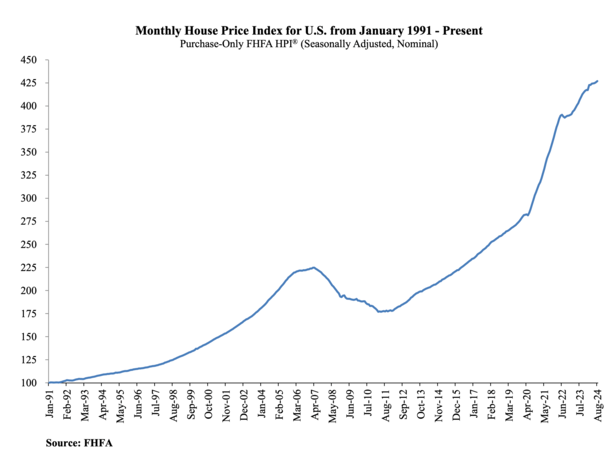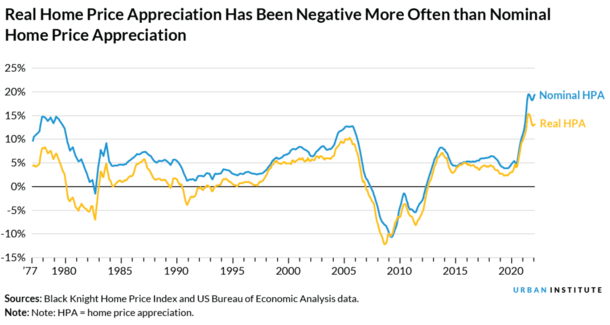It’s a story as old as time. Someone is trying to time the market, but failing miserably.
Then, they either miss out completely or chase an opportunity that no longer exists, and in doing so, they may overpay.
Recently, over dinner, a friend told me a story that seemed worth sharing.
These were two families who sold their townhouse, but only one purchased another property while the other rented it.
And guess what. Nearly five years later, the tenant is still a tenant.
It’s never easy to get the timing right, especially in real estate

It’s 2019. The real estate market has seen some pretty impressive gains since its lowest point around 2012 (see this chart from FHFA to find out more).
Housing prices have doubled in many markets across the country. For sellers, this seemed like the perfect time to cash out and move on.
Of course, if you sold a primary residence, you still needed a new home. This meant renting or buying another house.
A friend of mine had his first child and was expecting a second. Like many young families, they had purchased a smaller townhouse to get started.
But now it was time to find a larger space and move from an urban area to a more suburban environment to raise their family.
The good news is that the value of their townhouse has increased significantly since they purchased it.
This meant a good portion of the sale proceeds and an easy sale, with low inventory and properties in high demand at the time.
This also meant finding a replacement property, which was no easy feat for the same reasons.
Luckily, they were able to land a good deal on a single-family home in a desirable neighborhood, close to their in-laws, within a good school district.
Meanwhile, their former neighbors who lived in the same neighborhood also sold their townhouse. But instead of buying a replacement, they chose to rent it in the suburbs.
The husband told my friend that he was “going to wait for house prices to go down” given how much they were rising.
Now, I don’t blame this guy. I remember how frothy prices seemed at the time, before increasing another 50% during the pandemic.
But banking on a price drop and choosing to rent also came with a lot of uncertainty.
House prices rarely fall

The problem with the “wait for prices to drop” approach is that they rarely do.
That’s not to say they never fall, but house prices are pretty sticky. There have only been a handful of times where they have fallen on a nominal (not adjusted for inflation) basis.
They fell further in real terms, but even then this remains a fairly rare occurrence. Either way, buyers aren’t looking at house prices in real terms.
The prices they see on the ads are nominal. In other words, if the price was $500,000 and now it is $450,000, they will see it as a drop.
If they were $500,000, and they’re now worth $505,000, but inflation makes that $505,000 really worth something like $495,000, that doesn’t provide much relief to the potential buyer. It’s still higher in their eyes.
The problem is that some people have recency bias due to the mortgage crisis of the early 2000s, when house prices fell. And they think it can happen again. It’s possible, but again, it’s not common.
Now back to the story. The guy decides to rent while my friend buys a new house. It was in 2019.
Since then, the price of my friend’s house has skyrocketed, over 50%, because he got a good deal and had to do some work on site.
He also got a 30-year fixed mortgage rate in the high 2s, making his monthly payment pretty cheap, even though he bought when “prices were high” in 2019.
The other guy is still renting, almost five years later. And guess what? The rent is not cheap. So it’s not like he got a big discount in the process.
You know what else isn’t cheap? Mortgage rates. Or house prices. Yeah !
If the tenant buys now, he will have the impression of paying too much
So the guy who always rents tried to anticipate the market. And it didn’t turn out well, at least in hindsight.
There’s nothing wrong with renting, but this particular family doesn’t want to rent. They want to own a home.
Especially since they have children in local schools and want stability and peace of mind.
The problem now is that buying a home has become even more out of reach, thanks to rising house prices and much higher mortgage rates.
For example, a $500,000 home in 2019 might be closer to $750,000 today. And the mortgage rate 6.75% instead of 3%.
This would increase the mortgage payment by approximately $2,200 per month, assuming a 20% down payment. Not to mention the larger down payment required.
Even if he could still afford it, the guy probably has a lot of reservations, because he hesitated when the purchase was significantly cheaper.
To this end, he will likely continue to time the market and wait for a better opportunity. The one that may never happen.
Continue reading: Time heals all real estate wounds if you let it